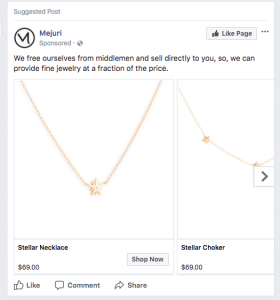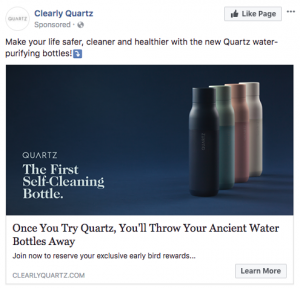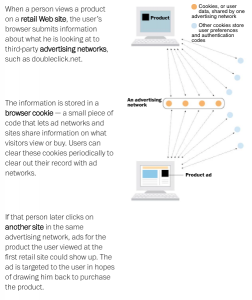How We Build and Respond to E-commerce
by Radhi
E-commerce is changing, rebuilding, and revolutionizing the way we buy and sell. There is a lot to say about E-commerce, but what I’ve found particularly interesting is how we, as consumers, play a part in it. Of course, we’re taken back to when it would be hard to find a particular item we were searching for. Now, type in some key search words and it AND its alternatives are presented to you. In many ways, technology has made the consumer decision harder, but the actual purchase incredibly easy. We have the likes of Amazon leading the way to make consumers be more likely to spend, along with their partnerships and sponsors.
I can search up for some jewelry on my phone but have ads appear on my facebook newsfeed on my laptop only hours later. They are the products I don’t ask to see, which give me a little anxiety. Below are actual “suggested posts” from my newsfeed on Facebook.


But do targeted ads work? According to Adam Ruins Everything, as platforms such as Google and Facebook allow you to search for things or like pages, you are essentially inputting information. That information is sold to different advertisers, and in return, they will send out targeted advertisements. The information on your age, gender, political affiliations, and income are all extremely valuable to help advertisers make the “selection” of products and services. 
As well as that, the consumer experience has psychologically been affected by e-commerce. As we buy more and more online, we are first, being tracked and shown alternatives that are possible which is a simplified version of the paradox of choice. This generally brings the “buyer’s remorse” into the online shopping world refreshed and different. In brick and mortar situations, we aren’t able to tell the pitfalls with the product until we actually try it, whereas a one-star review on Amazon is likely to deter us. The online experience reduces our actual value and personal connection to the good, with an anonymous delivery at our service as well. We feel the buyer’s remorse later on when we see our credit statement afterward.
To businesses, this information is excessively important, and without it, they would fail. In my eyes, the e-commerce world is going to keep growing and expanding. This is best exemplified in Jennifer Wu’s blog on Rent A Runway. However, that is regarding the blue ocean, where businesses are able to show that they fulfill consumer needs. Yet how do we become aware of the implicit and subtle ways that businesses expose us to buy? They use tools such as reinforcement and guilt as a part of our online shopping experience which doesn’t make much of a positive impact for us, but a profitable impact for them. For one, a better bet of creating an ad-free space is to use extensions such as AdBlock or even go on incognito.
Word Count: 441